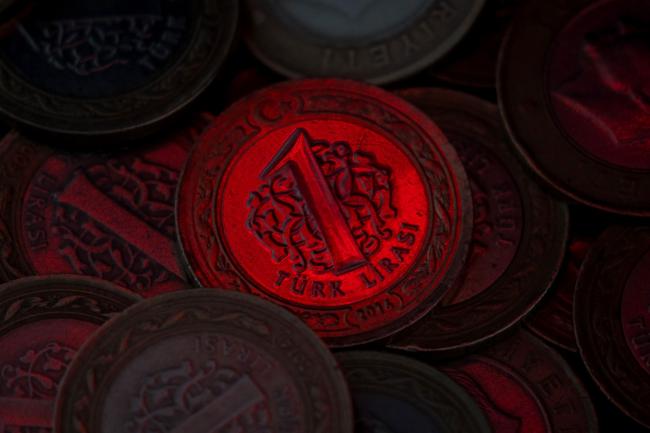(Bloomberg) -- Economists at some of the world’s biggest lenders are split over the likely path of Turkish interest rates as investor appetite for lower borrowing costs starts to wane after a seven-month easing cycle.
While JPMorgan Chase & Co (NYSE:JPM)., Deutsche Bank AG (DE:DBKGn) and Goldman Sachs Group (NYSE:GS) are joining the majority of analysts in predicting another decrease of between 25 basis points and 75 basis points, dissenters including Morgan Stanley (NYSE:MS), Barclays (LON:BARC) Bank Plc and HSBC Holdings Plc (LON:HSBA) see the key rate being kept at 11.25% on Wednesday.
More than at any time since Governor Murat Uysal took over in July, a pause could be in play for the Monetary Policy Committee following five straight rate cuts that took Turkey’s benchmark borrowing costs below zero when adjusted for inflation.
Market noise will be harder for Uysal to tune out this time, especially with price pressures bubbling up in the months ahead. After weathering 12.75 percentage points of rate cuts, the lira has grown more wobbly and Turkey’s geopolitical entanglements have added to unease among investors. More frequent MPC meetings this year provide another excuse to adjust the pace.
“Recent FX and rates volatility is likely to favor a wait-and-see approach, delaying potential rate cuts to the second quarter,” Barclays (LON:BARC) economists led by Michael Kafe said in a report. “Since the central bank has added four MPC meetings this year and inflation is expected to peak in March, a cautious stance may help alleviate market volatility.”
But interrupting the easing cycle carries risks for Uysal, whose predecessor was fired by President Recep Tayyip Erdogan for not reducing rates fast enough. Contrary to the thinking of most economists and central banks, Erdogan believes lower borrowing costs are more effective at slowing prices and has repeatedly said that rates will drop into single digits this year.
“Despite interest rates falling, the exchange rate didn’t explode, inflation didn’t jump, markets didn’t get stirred up, nor was any other difficulty experienced,” state-run Anadolu Agency cited Erdogan as telling lawmakers last week.
The urgency of monetary stimulus may also be fading. A gauge of Turkish manufacturing for last month swung into expansion territory for the first time in almost two years and industrial production ended 2019 on a bigger uptick than forecast, while unemployment is on the decline.
But imbalances are starting to emerge, a byproduct of the government’s pursuit of much faster economic growth this year. Its reliance on cheaper credit is pumping up domestic demand, resulting in a sharp increase in Turkish imports. That in turn has tipped the current account into deficit again.
Inflation Path
Meanwhile, inflation accelerated faster than forecast for a second month, reaching 12.2% in January. The central bank expects price growth to stay elevated in the first quarter at around 11.5% before it starts decelerating and drops to single digits from the second half.
Uysal said the central bank expects to offer investors a positive real rate of return when taking the projected path of inflation into account. Its current forecast is for consumer price growth to slow to 8.2% by year-end.
The lira slipped to a fresh nine-month low against the dollar on Tuesday and was little changed in early Asian trading on Wednesday. It’s lost about 3% over the past month.
While Goldman expects a rate cut of 25 basis points on Wednesday, it’s warning that the outlook for inflation and risks around currency volatility will eventually put a cap on monetary easing.
“This would be the smallest cut since the beginning of the cutting cycle,” Goldman Sachs (NYSE:GS) economists including Kevin Daly said in a note. “Turkey’s central bank will continue cutting rates, though in smaller increments.”
(Updates lira’s performance under ‘Inflation Path’ subheadline)
